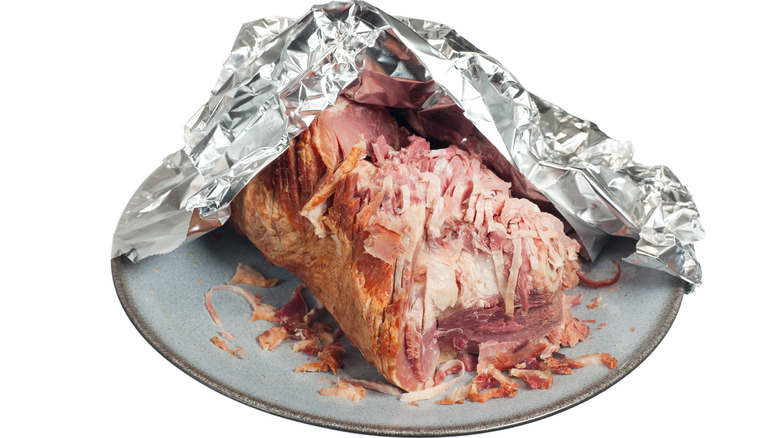Why You Should Think Twice Before Wrapping Your Leftovers In Foil
According to research conducted by Kitchen Cabinet Kings, of the 1,000 people they surveyed, those who reported eating leftovers say they do so to save time, effort, and reduce food waste. Of all the food storage options available, you may have heard the cautionary tales against plastic. It's been widely reported that the potentially harmful chemicals in plastic containers can make their way into our food, causing health disorders and even impacting our reproductive health (via Harvard Health Publishing). Therefore, foil might seem like a tempting alternative, but it turns out that foil may pose some problems of its own.
It's not uncommon for people to occasionally consume tiny pieces of plastic or food wrappers on accident. The same goes for the aluminum in foil. If ingested, our bodies can process aluminum fairly easily — as long as the amounts are small. According to The Conversation, food items such as corn and yellow cheese also contain aluminum. When we throw in the use of foil, are we ingesting too much aluminum for our bodies to handle?
Food that's exposed to air for too long can cause illness
It's possible that high levels of aluminum in the body may pose a risk to our health. For example, a 2001 study found that with greater aluminum exposure, cell growth developed at a slower rate within the brain.
Additionally, experts at The Healthy report that using foil as food wrapping can foster the growth of bacteria. Because foil is not airtight, in doing so, we leave our leftovers subject to oxygen exposure. Registered dietitian Lindsay Malone states via The Healthy, "When air is present, that allows the bacteria to grow faster, so you really want to get the right containers and pack things appropriately."
According to the U.S. Food and Drug Administration (FDA), bacillus cereus is one type of bacteria that can be found in food items not properly refrigerated. Food items particularly susceptible to outbreaks include vegetables, meats, and soups. Should you ingest contaminated food that has been left exposed to air for too long, you may experience symptoms such as nausea, stomach pain, and diarrhea.
For this reason, it's important to promptly refrigerate food, and stick to airtight containers. Don't get us wrong, we're all about reducing food waste — but not at the expense of foodborne illness.


